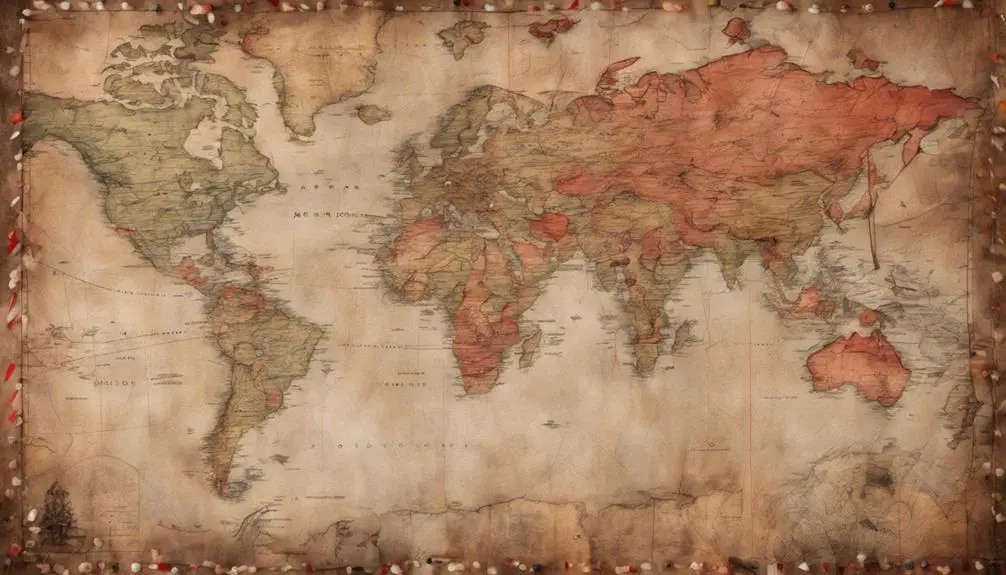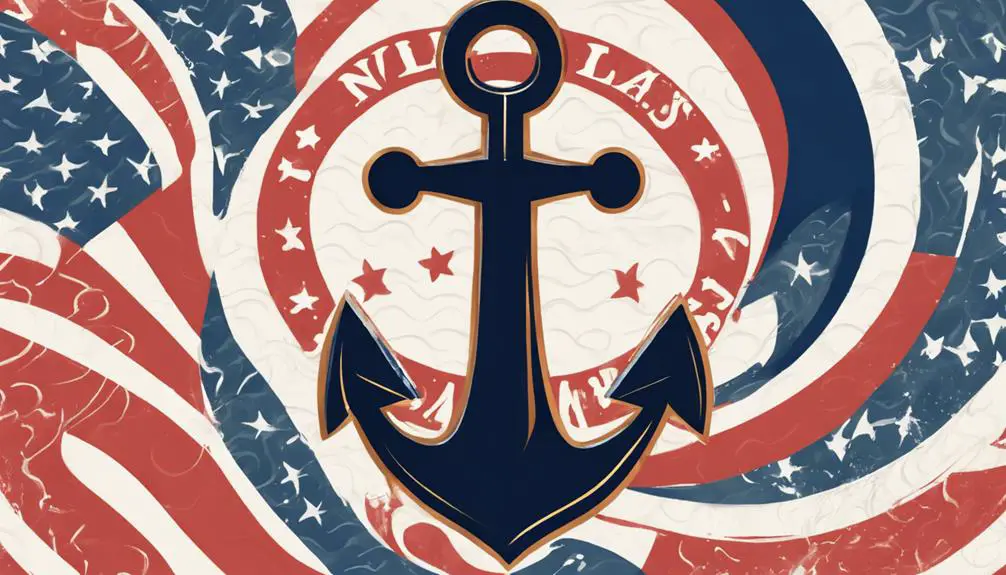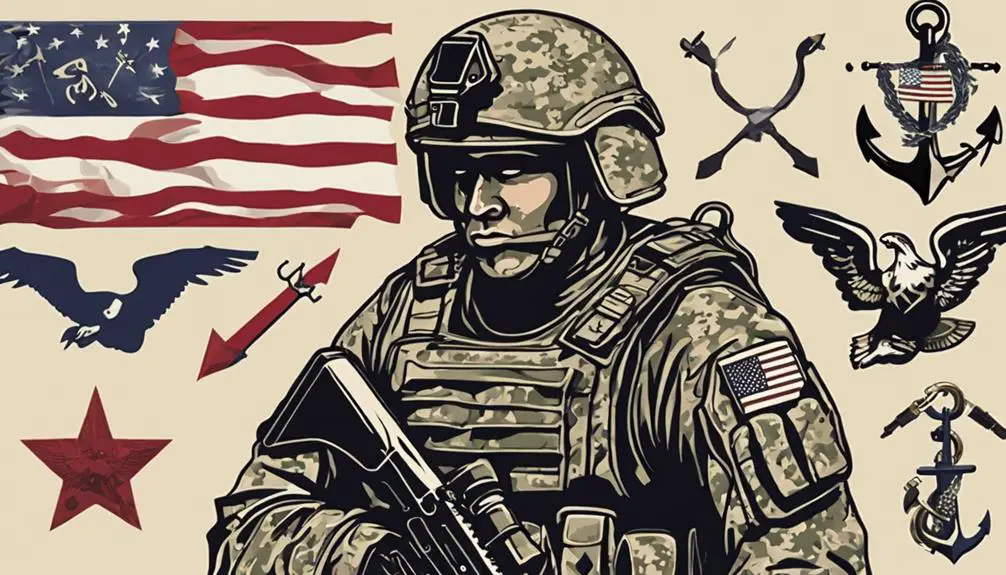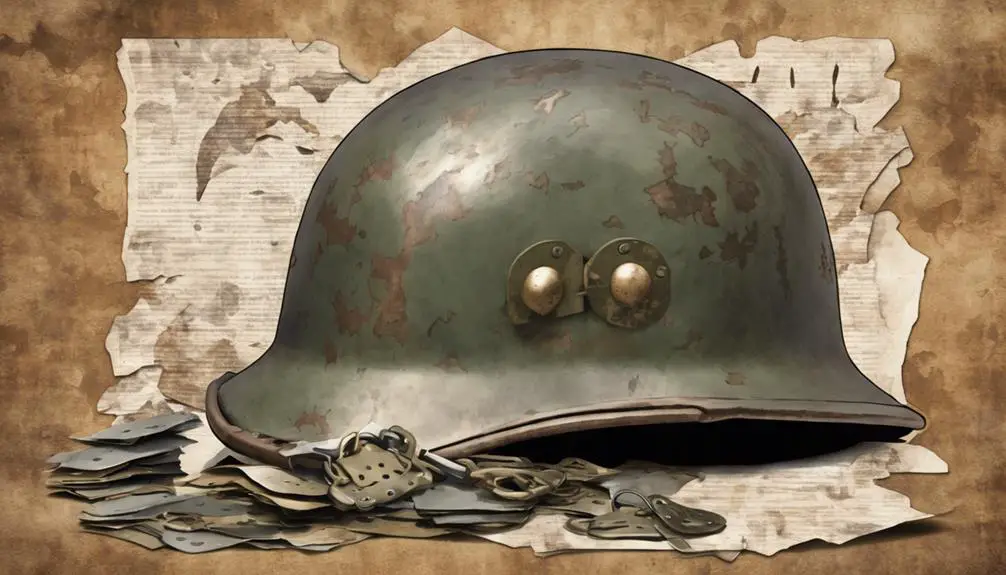You're about to explore the complex world of military slang, where the 'Big Six' branches of the US military have developed unique dialects, acronyms, and colloquialisms reflecting their distinct cultures and histories. From the Army's "HOOAH" to the Navy's "Anchors Aweigh," each branch has its own language. The Air Force has its "Bingo Fuel," the Marine Corps has "Oorah," and the Coast Guard and Space Force have their own slang too. As you venture deeper into this world, you'll uncover the nuances of each branch's language and how they shape identity and communication among soldiers. What other secrets will you uncover?
Origins of Military Slang

You've likely wondered how military slang originated, and historians pinpoint its roots to ancient Rome, where soldiers used colloquial language to differentiate themselves from civilians. This etymology analysis reveals that the use of slang was a way for soldiers to explore a sense of camaraderie and shared identity, setting them apart from the general population.
In ancient Rome, soldiers used colloquial Latin to communicate, which was distinct from the formal Latin spoken by civilians. This historical context highlights the significance of slang in military culture, as it served as a means of social bonding and group identification.
As you investigate further into the origins of military slang, you'll discover that it wasn't unique to ancient Rome. Throughout history, militaries have developed their own unique slang to serve their specific needs. For instance, during World War I, soldiers used slang to describe the harsh realities of war, such as 'trench foot' and 'shell shock.'
This historical context underscores the importance of slang in military culture, as it provides a unique window into the experiences and perspectives of soldiers.
Army Slang Essentials
As you explore the world of modern military slang, you'll find that the US Army, in particular, has developed a unique vocabulary that reflects its distinct culture and experiences. The Army's slang etiquette is rooted in its history, with phrases and words often derived from historical events, military jargon, and colloquialisms. You'll notice that Army slang is often used to convey a sense of camaraderie, humor, and shared experience among soldiers.
Military lingo in the Army is characterized by its use of acronyms, abbreviations, and colloquial expressions. For instance, 'HOOAH' (Heard, Understood, Acknowledged) is a common expression used to show enthusiasm or agreement. Other examples include 'SITREP' (Situation Report), 'OPSEC' (Operational Security), and 'FOB' (Forward Operating Base). These phrases have become integral to the Army's cultural identity, serving as a shared language that transcends rank and unit boundaries.
As you investigate further into Army slang, you'll discover that it's not just about using the right words – it's about understanding the context, tone, and nuances that come with using them. By grasping the intricacies of Army slang etiquette, you'll gain a deeper appreciation for the complexities of military culture and the people who serve.
Navy Slang Decoded

Delving into the world of naval terminology, you'll find that the US Navy's slang is deeply rooted in its maritime history, with phrases and expressions often derived from nautical traditions, shipborne experiences, and technical jargon.
As you navigate the Navy's linguistic landscape, you'll encounter a unique lexicon that's equal parts functional and fascinating.
Here are a few examples of Navy slang decoded:
- Anchors Aweigh: This classic nautical phrase is often used to signal the start of a journey or a new beginning.
- Submarine Speak: Submariners use a distinct dialect that's full of abbreviations and acronyms, such as 'dive, dive, dive' to signal an emergency dive.
- Scuttlebutt: This term refers to a ship's water cooler or gossip hub, where sailors gather to swap stories and share rumors.
- Sound Off: This phrase is used to signal the start or end of a task, similar to a 'start your engines' or 'mission accomplished' notification.
As you explore the world of Navy slang, you'll discover a rich tapestry of words and phrases that reflect the service's history, culture, and values.
Air Force Lingo 101
In the Air Force, pilots and personnel rely on a unique argot that's equal parts technical jargon, colloquialisms, and cultural references to communicate complex ideas and execute missions efficiently.
You'll often hear airmen tossing around terms like 'Flight Deck' to refer to the cockpit or 'Aviator Culture' to describe the distinct identity and values shared among pilots.
When you're part of the Air Force, you quickly learn that terminology like 'Bingo Fuel' (minimum fuel required to return to base) or 'Feet Wet' (over water) is essential for clear communication during flight operations.
You'll also pick up on colloquialisms like 'Bitching Betty' (a warning voice in aircraft) or 'G-Suit' (pressure suit worn by pilots).
Understanding Air Force lingo is important for effective teamwork and decision-making. It's not just about speaking the language; it's about being part of a tight-knit community that relies on precision and trust.
As you navigate the world of Air Force Lingo 101, remember that every term, phrase, and expression plays a crucial role in the success of the mission.
Marine Corps Jargon

You'll find that Marine Corps jargon is a distinct dialect that's deeply rooted in the Corps' rich history and warrior culture, with terms like 'Oorah' (an expression of enthusiasm) and 'High-Speed, Low-Drag' (a Marine who excels in combat and garrison duties) reflecting the service's values and traditions.
As you explore further into Marine Corps jargon, you'll discover a unique lexicon that's shaped by the Corps' esprit de corps and Jarhead Culture. You'll encounter terms like:
- Devil Dog: a nickname for Marines, symbolizing their tenacity and ferocity on the battlefield
- Oorah: an expression of enthusiasm, approval, or motivation
- Sandbox: a term used to describe combat zones or areas of operations
- Hoo-ah: an expression of excitement, agreement, or solidarity
These terms not only reflect the Marine Corps' values and traditions but also serve as a tribute to the service's rich history and cultural heritage.
Coast Guard Colloquialisms
The Coast Guard's distinctive colloquialisms, shaped by its maritime heritage and search-and-rescue mission, provide a unique window into the service's values and operational culture.
As you explore the world of Coast Guard slang, you'll notice a strong emphasis on community and teamwork. The service's motto, Semper Paratus (Always Ready), reflects its commitment to being prepared for any situation.
You'll hear Coast Guardsmen refer to their vessels as 'cutters,' a nod to the historic sailing ships that once patrolled the coastline. This 'Cutter Culture' is deeply ingrained in the service, with each ship having its own distinct identity and traditions.
In the Coast Guard, you'll hear terms like 'deck ape' (a seaman apprentice) and 'surfman' (an expert in surf rescue operations). You might also encounter 'buoy tender,' which refers to a ship responsible for maintaining navigational aids like buoys and lighthouses.
These colloquialisms not only reflect the service's unique mission but also foster a sense of camaraderie among its members. As you investigate the world of Coast Guard slang, you'll gain a deeper appreciation for the service's rich history and values.
Space Force Slang Evolution

How do the nascent slang traditions of the Space Force, an institution still charting its course, reflect the evolving identity of this newest branch of the US military?
As you explore the Galactic Lingo emerging within the Space Force, you'll notice a unique blend of technical jargon, astronomical references, and playful abbreviations. This Cosmic Codes phenomenon is shaping the branch's distinct voice and personality.
Some notable examples of Space Force slang include:
- Astro: short for astronaut, used to address or refer to a fellow Space Force member
- Orbit: a meeting or gathering, often virtual, to discuss ongoing projects or missions
- Celestial: an impressive achievement or remarkable feat, often accompanied by a digital badge or award
- Galactic Gap: a humorous term for the challenges and uncertainties that come with pioneering a new branch of the military
As the Space Force continues to evolve, its slang will likely adapt and expand, reflecting the branch's growth and maturation.
Lost in Translation
Six decades of military slang have created a rich cultural heritage, but they also pose a significant challenge: finding a common language among the Big Six.
As you navigate the complex world of military slang, you'll encounter cultural barriers that can hinder effective communication. You might be familiar with the lingo used by the Army, but what about the Navy, Air Force, Marines, Coast Guard, or Space Force?
Each branch has its unique terminology, and that's where the language hurdles begin. You might be 'hanging loose' with the Coast Guard, but what does that mean to the Air Force?
The cultural nuances and specialized jargon can create confusion, leading to miscommunication and potential misunderstandings. To overcome these obstacles, it's essential to acknowledge the cultural barriers and language hurdles that exist among the Big Six.
Frequently Asked Questions
Can Civilians Use Military Slang Without Getting Ridiculed?
When you use military slang, you're borrowing from a cultural identity that's not yours. It raises questions about cultural appropriation, where you're taking symbols or language from a group without fully understanding or respecting their experience.
Your social identity, as a civilian, doesn't align with the military's cultural context. Using their slang without being part of that community can come across as superficial or even disrespectful.
Are Military Slang Terms Official or Just Informal Expressions?
You might wonder if slang terms are officially recognized or just informal expressions.
In reality, many slang terms lack formal classification, emerging through historical evolution rather than deliberate creation. They're often born from cultural and social contexts, spreading through oral tradition.
While not formally recognized, these terms become integral to military culture, blurring the line between formal and informal language.
Can Military Slang Be Used in Formal Military Communications?
When you're considering using military slang in formal military communications, you should think twice. While slang can convey complex ideas with formal brevity, it's generally not suitable for official tone.
In formal communications, clarity and precision are paramount, and slang can lead to misinterpretation. Stick to standardized language to make sure your message is conveyed accurately and professionally.
Are There Military Slang Terms Specifically for Veterans Only?
You're wondering if there are military slang terms reserved exclusively for veterans.
Intriguingly, veteran exclusivity in slang often emerges as a natural consequence of shared experiences and camaraderie.
As slang evolves, certain terms become synonymous with veteran culture, signifying a sense of belonging and shared identity.
While not all veterans use these terms, they're often reserved for those who've earned the right to use them, creating a sense of veteran exclusivity.
Can Military Slang Be Used in Other Languages or Only English?
As you venture into the domain of military slang, you'll find that language barriers don't necessarily hinder its use. Slang can be adapted and translated, allowing it to transcend cultural boundaries.
In fact, cultural adaptation is key to adopting military slang in non-English languages. You'll discover that many countries have their own military slang, often born from local dialects and colloquialisms.
Conclusion
You've navigated the alphabet soup of military slang, and now you're fluent in the lingo of the Big Six. Think of it like cracking a secret code – once you understand the nuances of each branch's slang, the jargon transforms from gibberish to a rich dialect that's as clear as a sunny day.
Like a perfectly tuned engine, your newfound knowledge will hum along smoothly, allowing you to communicate with ease and precision, whether you're on the ground, in the air, or at sea.







